- Home
- Lynne Truss
Tennyson's Gift Page 7
Tennyson's Gift Read online
Page 7
‘Can you see my excellent temples, Julia?’
‘They are displayed to great advantage, Mr Watts!’
Taking photographs by the fashionable wet-collodion process was a tricky, smelly, neck-straining business, and took an unconscionable amount of time, especially the way Julia preferred to do it, with dim light and slow exposures. Watts’s beard was spread dramatically over the bodice of a grubby white muslin shift, belted at the waist. He sat completely still, with an expression fixed and glassy. Underneath his tunic, where realistically he should have sported bare legs and sandals, he wore tweed trews and thick boots. They made him very hot.
‘These trews, Julia –’ he had begun.
‘Forget them!’ she said. ‘They will not be visible in the picture!’
‘Oh. I see. Oh, very well.’
Not only was it stifling in this makeshift studio, but there was a strong smell from the fresh seaweed coiled round his neck, yet Watts was a fairly happy man. How charming to see someone else slaving for art, for once. How pleasant, too, to slip away from the tiresome child-wife, who had been in a peculiar mood ever since leaving London. The last time he saw her she was skipping off like a little girl through the garden at Farringford, without a thought for the etiquette of tea with one’s elders. The trouble with Ellen, he reflected, was that she could be so many different sizes in the course of a single day.
‘Forty-two, forty-three, forty-four, hm?’ barked Mrs Cameron, nodding to him encouragingly, as she walked briskly up and down in her red velvet dress (such energy she had, she was the sort of woman who seemed to run at breakneck speed just to stand still). Watts could feel the sweat starting from his brow. Also, was he imagining it, or could he really remember mentioning a turd at teatime to Mrs Tennyson?
‘Forty-five, forty-six!’
Watts had been in Freshwater just three hours, and already Mrs Cameron had dressed him up and got him to work, photographically speaking. Mrs Cameron was deeply fond of Watts, and the reason was not hard to find. Here was a man who knew how to accept her presents, to repay hospitality with humble thanks and words of praise for her kindness. This was a simple matter to Watts, for early in life he had learned the confoundedly simple social lesson that ‘How can I ever repay you?’ released you from any obligation to cough up ninepence. Amazing, but true. Throw no gift again at the giver’s head was a foolproof precept for a cheap life in good company. And of course he would sit for Julia. Did it cost him anything?
No.
She sneezed. He reacted, but recovered himself.
‘Ignore me!’ she said. ‘Just the chemicals, you know! Don’t move! Hm? Stay still! Observe your map, George, with conflicting emotions! Big eyes! Big eyes!’
Watts complied with all this barked advice (delivered in a loud voice, as if sitting still had made him deaf), but he was convinced his crown was slipping, and that the picture would be ruined by the silvery ghost of his locomotive hat. But summoning up the required conflicting emotions of the old Ulysses was not too difficult, he found. On his knee was a crude outline of the Aegean, drawn on a pillow case. ‘Why? How? What? When? Where?’ he therefore asked himself with genuine confusion.
He had no idea why Julia chose him for Ulysses. After all, he was hardly the heroic nautical type. One minute he’d been snoozing pleasantly in Tennyson’s garden, the next he was planning one final heroic voyage toward death in a blacked-out chicken shed. But despite his shortcomings in the Greek hero line, he saw nothing inherently ridiculous in the situation. Where lesser aesthetes, for example, might have queried the choice of implement in his right hand – a small, three-pronged toasting fork, representing ten long years of epic maritime adventure – Watts thought it rather ingenious, and made a mental note.
‘A hundred and one, a hundred and two, a hundred and three.’ The painter did not move his head – after all, he had his conflicting emotions to attend to, and he had selected a daring combination, comprising pensive and sublime in the upper cranial regions, with a bit of melancholy in the cheekbone area, and poetic firmness about the mouth. Knowing the action to be permissible, he blinked every thirty seconds. Mrs Cameron allowed her sitters to blink, partly because she grudgingly accepted the necessity, but mainly because she had found the effect of blinks on the final picture artistically desirable. Blinking added a spiritual opaqueness to the eyes, which in turn added to the general air of sublimity. Her latest picture of Mary Ann – ‘Can I but relive in sadness?’ – had the eyes so filmy and opaque that truly it made people yawn and stretch their arms just to look at it.
‘A hundred and forty-nine, hm? A hundred and fifty.’
Watts had no idea how long this would go on (it could go as high as five hundred if the exposure was seven or eight minutes), but he was already tired. He resolved that for his next sitting he would choose his own hero, and select a dead one. The corpse of Hector, perhaps; or the Morte d’Arthur – anything that would entail lying prone on cushions. Or he could embody that superb short sentence, ‘Homer sometimes nods.’ Now his arm ached; the occasional whiff of ether snatched at his tonsils, and at his side, not improving matters in the least, that uppity Irish servant girl recited Tennyson’s Ulysses, presumably to get him in the mood.
Such a lot of Tennyson one must endure suddenly! He gave her his attention for a moment. She had just reached the bit that went, ‘Tis not too late to seek a newer world.’
‘Oh, dear,’ thought Watts. ‘More dreary exhorting stuff. A chap who is capable of The Lotos-Eaters, too. Why does Ulysses not remain at home with his charming wife? It has taken him such a long time to get there, after all.’
‘A hundred and sixty, a hundred and sixty-one,’ continued Mrs Cameron, nodding at him with her hands steepled together, praying him to be still. ‘A hundred and sixty-two – Don’t move!’ Watts could feel the crown sliding, and his emotions conflicted even more. His thoughts turned to Ellen again – before they left London she had casually mentioned the phrase ‘Patience on a monument’, an absolutely splendid notion for a high-but-extremely-narrow wall he’d heard mentioned in the Clerkenwell area.
‘It may be that the gulfs will wash us down,’ said the girl, unheard by Watts. ‘Oh, this part is so grand,’ she said, breaking off. ‘Do you not think so, madam? Is it not the grandest thing?’
‘It is by Alfred Tennyson, Mary,’ said Mrs Cameron.
‘I know, madam. We learned it in the schoolroom – your sons and I, when you very kindly educated me above my station for no purpose. I know it word for word. In fact I feel that I know it as well as Mr Tennyson does himself.’
‘I wouldn’t count on it,’ muttered Mrs Cameron (the treachery of Mariana’s peach was still fresh in her mind).
And so the girl continued, from memory, closing the book.
‘It may be that the gulfs will wash us down:
It may be we shall touch the Happy Isles,
And see the great Achilles, whom we knew.
Tho’ much is taken, much abides; and tho’
We are not now that strength –’
Mrs Cameron interrupted.
‘That last part again, Mary, please. I think I heard you touch on the ideal title for this very wonderful picture of Mr Watts, whose noble brow has never shone to such advantage. But I must respect Il Signor’s concentration, which is profound, and is a lesson to us all!’ (It was true. Mentally, Watts was no longer in the room.) ‘Again, Mary! But quietly. Let me hear the lines once more!’
‘It may be that the gulfs will wash us down: [repeated Mary]
It may be we shall touch the Happy Isles,
And see the great Achilles, whom we knew.
Tho’ much is taken, much abides; and –’
Mrs Cameron clapped her hands for joy.
‘That’s it!’ she exclaimed. ‘Tho’ much is taken much abides! That’s it!’
Watts, hearing the cry, was recalled from his reverie.
‘It is?’ he said thankfully, standing up, and removing his crown. ‘M
uch as I love to labour for the muse, Julia, I am profoundly glad to hear it.’
He looked at her.
‘Is something amiss, my dear?’
And Mrs Cameron, her picture ruined, watched him with her eyes like saucers, all aghast.
Several minutes after the Ulysses disaster, Mrs Cameron had prepared another plate by coating it with collodion (gun cotton dissolved in ether), washing it in water, and then sensitizing it in a bath of silver nitrate and glacial acetic acid. This chemical stuff had been a bugger to learn, as you can imagine. She removed the plate carefully between two blackened fingers, peered closely, remarked, ‘Perfectly satisfactory, just a few hairs and scratches,’ and then sneezed on it violently. She threw it out of the door.
The next plate was ruined when it cracked and broke being taken out of the camera; the next when the door to the chicken house flew open unexpectedly during the exposure; the third reached its required seven minutes without mishap, but Mr Watts was found to have moved some inches, due to falling asleep; another plate was dropped on the floor during another tricky process involving pyrogallic acid. The worst hold-up of all, however, was not technical but artistic, when Mary recommenced her reading of Ulysses, and mentioned that the king sat ‘among these barren crags’ – an optional point, thought Watts; but Mrs Cameron, who groaned and smacked her forehead when she heard it, felt bound to represent the rocks, and sent the gardener to find a craggy-looking sack of garden rubbish for Mr Watts to stand on. Watts begged to be excused: he could not stand on a bag of rubbish. And so she had him lolling – which suited him more – and finally, a plate was exposed, developed and fixed.
At which point, with the picture printing on to coated paper in the late afternoon sunshine outside, the accumulated stress overcame Mrs Cameron and she began to cry out, ‘Oh! Oh!’, shaking her hand and running on the spot.
‘What is the matter, Julia?’ asked Watts. ‘Have you pricked your finger?’
‘I haven’t pricked it yet. But I soon shall, George, it is only a matter of time, and then potassium cyanide will pass into the cut and course through my bloodstream and then I shall die! Oh! Oh! And nobody will miss me – least of all Alfred Tennyson, the biggest ingrate who ever lived! Oh! Oh!’
‘You mean you may give your life for your art, Julia?’ asked Watts, patting her hand. ‘But wouldn’t that be a splendid thing to do? I think so often these days of poor old Haydon, you know.’
‘Haydon? Why?’
‘I’m not completely sure. But he haunts my dreams with a telescope, Julia; he never quite leaves me alone. He seems to blame me for having a patron and a comfortable life, when he struggled alone in the hard, hard world of bills and debt and children. But that’s not my fault, is it? He even begrudges me Ellen – although I’d better not go into that.’
‘Oh the dear talentless man,’ agreed Mrs Cameron. Kind-hearted soul that she was, she immediately forgot her own troubles, thinking of someone else’s. ‘Of course we bought his sensational journals when they were published after his death. Charles and I read them in the evenings aloud, and cried a great deal, especially the bits about his brain being too big and driving him mad.’
‘I know,’ agreed Watts morosely. ‘Those journals were a cracking read.’
‘Yes, but Alfred must never know I read them, George! You know how he disapproves of morbid curiosity – which is odd in him, really,’ she reflected, ‘when he has done so much to make morbid his own middle name.’
And at the thought of dear old Alfred ‘Morbid’ Tennyson, Mrs Cameron sighed and slumped, and stared at his special gate with eyes forlorn.
‘Julia?’
‘Yes, George.’
‘You don’t suppose it was my fault, do you? That Haydon took his life? It wasn’t because I was getting all the decent walls?’
Mrs Cameron was amazed by the question.
‘I am sure he never blamed you, George. But I think it shows the greatness of your heart that you think in such terms.’
She paused. A thought had struck her.
‘Are there not plenty of walls to go round?’
‘Alas, no, Julia. A good public wall is worth a thousand pounds a foot. And before Haydon made a point of demanding some, there were virtually no walls at all.’
‘No walls at all? I see. Well, no wonder he was such a champion of the Elgin Marbles – there’s walls for you. Speaking of which, you didn’t see whether the Tennysons had hung that exquisite wallpaper I gave them? I’ve asked so many times now, I can’t –’
She trailed off. Watts looked nonplussed. He was not a man on whom wallpaper made an impression.
‘As for Haydon, however,’ continued Mrs Cameron, ‘it was the American midget that killed him, George, metaphorically speaking. Everyone knows that. He could not endure it that all the visitors to his terrible last exhibition preferred to go next door and see that yankee short person, what was his name –?’
‘Colonel Tom Thumb.’
‘– Yes, that’s him. Losing out to a freak, it was so undignified, for a man of his high artistic aims.’
Watts considered. He supposed this must be true. The indignity must have been frightful.
‘Actually, I heard the freak was good,’ he said at last.
‘He was. We went twice.’
‘Oh.’
‘We bought the book.’
‘And Haydon’s pictures were bad?’
‘They stank, George. They reeked. His talent was never close to yours, whatever you may think. You are England’s Michelangelo! Haydon was just a dauber on a very large scale. People only kept asking for his “Napoleon on St Helena” because it was a back view, you know, and because they felt sorry for him. And another thing. Despite all his devout talk and perpetual prayer, it must never be forgotten that Haydon used his own face as a model for the countenance of Our Lord. I fear I can never forgive him for that.’
‘It was a bit presumptuous, I suppose –’
Mrs Cameron snorted.
‘– But perhaps no other head was available, Julia.’ Mrs Cameron considered the argument for a moment and rejected it.
‘There is always a head available, George. We both know that.’
Back at the Albion Hotel, Jessie folded her arms and assumed an expression which in an older person might have been deemed murderous. It had been a horrible day. Those nincompoops Daisy and Annie had mooned around Mr Dodgson, letting him write them poems and draw funny pictures on the sand with a stick. Daisy had even let Mr Dodgson pin up her skirt again, pretending that she had no safety pins of her own. (She had lots, in fact. Jessie had seen them. Jessie had even equipped her with a dozen of her own.)
Her face was nearly purple with emotion. If Watts had seen her, he would have been prompted to pronounce that old infallible dictum, ‘Short folk are soon angry.’
‘I love my love with a D!’ said Jessie, spitting out the words. ‘Because he is a Darling Doggie Dumb-Dumb Dodo! Argh!
Pah! Pooh!’
Jessie had expected a bit more attention for herself, that was the sum of it. Dodgson had been absorbed elsewhere, and although she disapproved of him, the rejection stung her. She had yet to learn the sad fiscal lesson of the plain female, that if you don’t pay compliments to the male gender, you don’t get any back. Lionel Tennyson had virtually ignored her, preferring to chat with a pretty woman fully double her age (Ellen, who was indeed sixteen). To cap it all, Ada had abandoned her, disappearing behind the bathing machines in a sneaking manner the moment Lionel turned up. Ada ought to be a bit more grateful to Pa and me, Jessie thought. We picked her up when she was virtually destitute, and we can just as easily drop her again.
She kicked a table leg.
‘The trouble with everybody,’ said Jessie aloud, ‘Is that they’ve got no Organ of Gratitude.’
She pursed her lips, pulled her folded arms more tightly to her chest, and let the words revolve in her mind.
Ha! No Organ of Gratitude at all, some people; What some pe
ople need sharpening up is their Organ of Gratitude.
Hardly knowing what she was doing, she started to feel her own head, to check that her own Organ of Gratitude was of decent size and health. But she stopped again. Hold on a minute, she thought, where is the Organ of Gratitude? She knew where Benevolence was. Also Acquisitiveness, which in her own case was substantial. But Gratitude? Where ought it to fit in? Was it a higher emotion, or a baser one? Animals were supposed to feel gratitude. But wasn’t it a cornerstone of human relations? Weren’t good people benevolent so that others could be grateful? Puzzled, she ran to Lorenzo’s charts and scanned them for an answer. It wasn’t there.
Jessie took several deep breaths and searched again. It still wasn’t.
‘Christopher Columbus!’ she whispered. For suddenly it was as plain as day: Nobody had yet discovered the Organ of Gratitude! Phrenology had been going for seventy years, and nobody had located one of the most fundamental organs. And then, one day, a small lisping infant asked the question, ‘Where ith gwatitood Daddy?’ and revolutionized science.
It sounded like a great myth; she could already visualize the pamphlet. ‘How Jessie Fowler located the Organ of Gratitude, Unaided by a Grown-up – Chapter One: Out of the Mouths of Babes.’
As you may see, the scientific implications of this breakthrough were not lost on Jessie. In phrenological terms, her discovery on this Friday afternoon in Freshwater Bay was a landmark. It was like being the first person ever to say, ‘Yes, this River Nile is all very well, and yes it’s got some very snappy crocodiles in it, but where does it come from, then? Don’t you think somebody ought to head up country in a pith helmet and find out?’

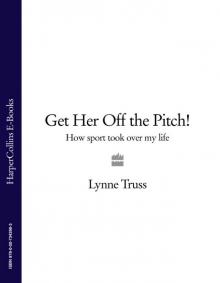 Get Her Off the Pitch! How Sport Took Over My Life
Get Her Off the Pitch! How Sport Took Over My Life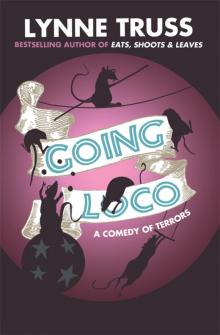 Going Loco
Going Loco Talk to the Hand
Talk to the Hand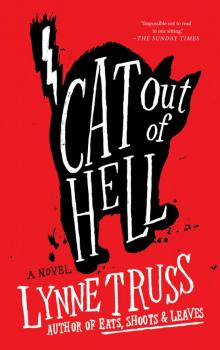 Cat Out of Hell
Cat Out of Hell Eats, Shoots and Leaves
Eats, Shoots and Leaves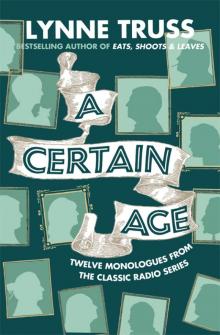 A Certain Age: Twelve Monologues From the Classic Radio Series
A Certain Age: Twelve Monologues From the Classic Radio Series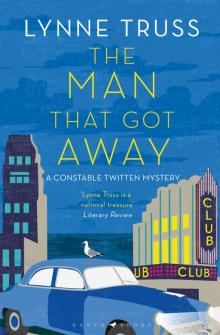 The Man That Got Away
The Man That Got Away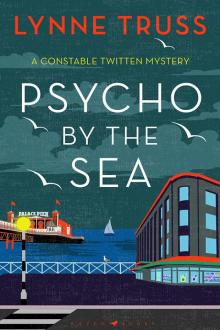 Psycho by the Sea
Psycho by the Sea With One Lousy Free Packet of Seed
With One Lousy Free Packet of Seed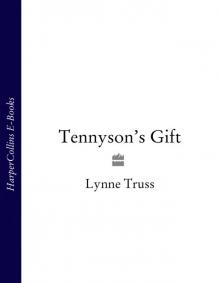 Tennyson's Gift: Stories From the Lynne Truss Omnibus, Book 2
Tennyson's Gift: Stories From the Lynne Truss Omnibus, Book 2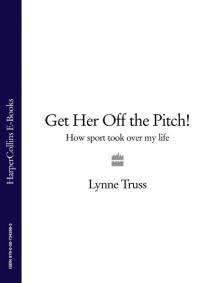 Get Her Off the Pitch!
Get Her Off the Pitch!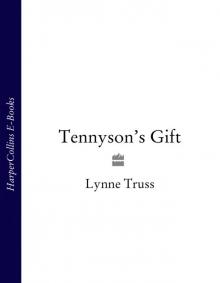 Tennyson's Gift
Tennyson's Gift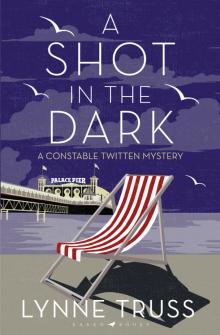 A Shot in the Dark
A Shot in the Dark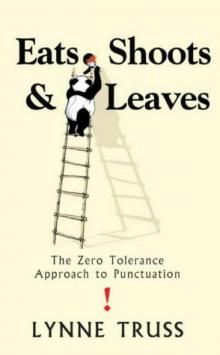 Eats, Shoots and Leaves: The Zero Tolerance Approach to Punctuation
Eats, Shoots and Leaves: The Zero Tolerance Approach to Punctuation